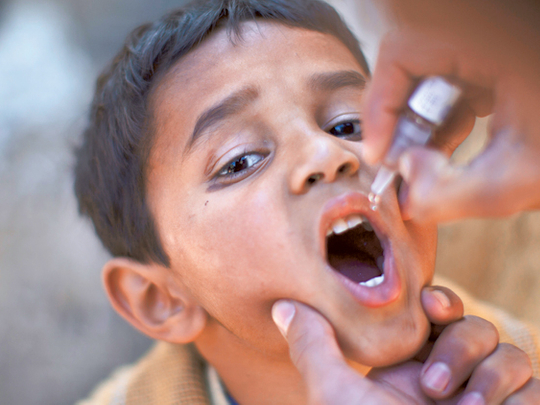
Islamabad: Pakistan is one of the two countries in the world where polio poses a serious threat to children after Africa was declared free from wild poliovirus this month. The other is Afghanistan.
Global health experts have described the polio situation in Pakistan particularly the outbreak of the virus in Khyber Pakhtunkhwa (KP) province alongside Karachi and Quetta as extremely worrying. The Independent Monitoring Board (IMB) that evaluates the progress being made by the Global Polio Eradication Initiative (GPEI) fears transmission is expanding to previously polio-free areas of Pakistan.
SEE ALSO
- UAE: Ticket cancelled due to COVID-19, but no refund from travel agency, for over 60 days
- Nepotism debate: From Alia Bhatt to Kareena Kapoor, a look at talented star kids who have outdone themselves in Bollywood
- 10 Bollywood and Hollywood couples who’ve stood the test of time
- Dubai: Amazing kid-friendly fun and discounts to enjoy before summer ends
In the absence of mass vaccination activities, “there will be many more polio cases than expected by the end of the year. The numbers could go into hundreds,” the report warned. There were 61 poliovirus cases in 2020 (by July end) compared to 56 by this time in 2019. “The surge in vaccine-derived polio cases in Pakistan is shocking” it noted.
Punjab – The province’s major city Lahore reported the circulation of wild poliovirus for about 15 months where the authorities have not been able to stop transmission.
Khyber Pakhtunkhwa – The province has had a widespread transmission of both wild and vaccine-derived polioviruses. KP accounted for 63 per cent of all polio cases in Pakistan in 2019 with most cases reported from Bannu Division (Bannu, Lakki Marwat, North Waziristan districts).
Sindh – The province has reported 20 cases by July 2020 as compared to only four cases by the same time last year. The number of “still missed” children is a big cause for concern, especially in Karachi where between 30,000 and 40,000 children are not being vaccinated, the report claimed.
Balochistan – The poliovirus returned to the province since May 2019 in the known hotspots in Quetta Block, comprising parts of Quetta City, Chaman tehsil in the Killa Abdullah district, and Pishin district. The Quetta Block is a key contributor to the cross-border poliovirus corridor connected with the southern region of Afghanistan.
Over 32 million vaccinated
During the August 2020 immunization campaign, more than 32 million children under the age of five have been vaccinated in 130 districts across Pakistan.
“We have managed to achieve impressive coverage despite the challenging context of the COVID-19, hot weather and heavy rainfall… Children have also been administered Vitamin A supplements to strengthen their immune system during the campaign,” Dr. Rana Muhammad Safdar, coordinator at the Pakistan Polio Eradication Programme, said. “Still, we have challenges to overcome,” he added. “Data-driven analysis of challenges at the grassroots level helps us identify the underlying issues associated with missed children, pockets of refusals as well as reservoirs of poliovirus circulation.”
Challenges
Vaccine refusals and misconceptions have largely hindered the vaccine drive in Pakistan’s distant regions. Delays in vaccine acceptance, low vaccination coverage and lack of awareness are some other challenges, according to Dr. Ali Faisal Saleem, paediatrician at Aga Khan University Hospital.
Dennis Chimenya who leads UNICEF’s communications activities to counter misconceptions, says, “Parents in some communities refuse vaccines, due to rumours and beliefs they hold.” His team’s job is to convince more people to accept vaccines that have saved millions of kids from paralysis. “Pakistan is a developing country, with a huge population facing multiple deprivations,” he said expressing hope that the country will become polio free but “it will take a long time to get there.”
Fast facts
• Pakistan is one of only two countries in the world, along with Afghanistan, where polio is endemic
• 65 cases have been reported in 2020 so far while the total number of cases reported in 2019 cases remains 147
• Polio is a highly-infectious, disabling and sometimes fatal disease
• Polio mainly affects children under five
• Large scale vaccinations can help boost immunity
• Cheap and effective vaccinations are available for polio
• Polio can be completely eradicated








